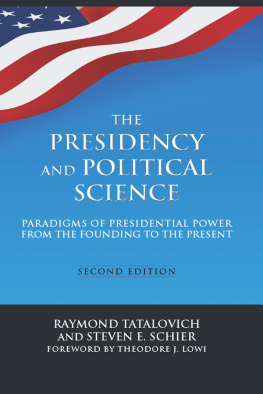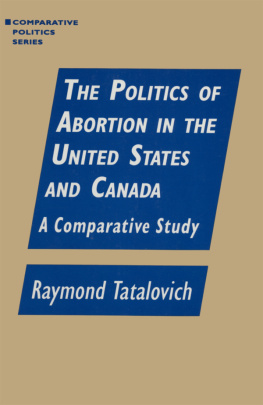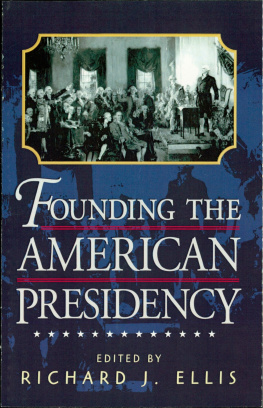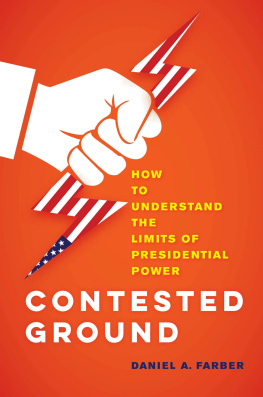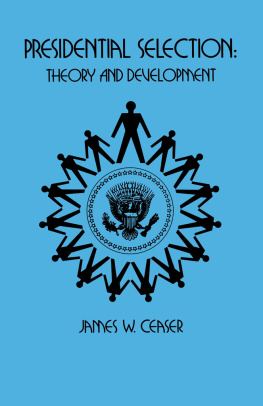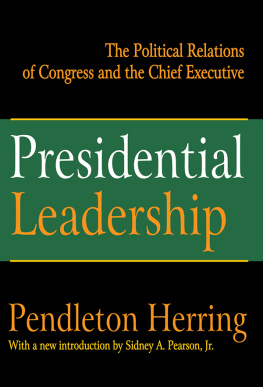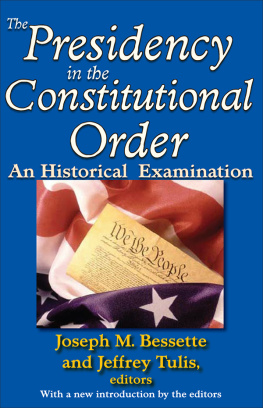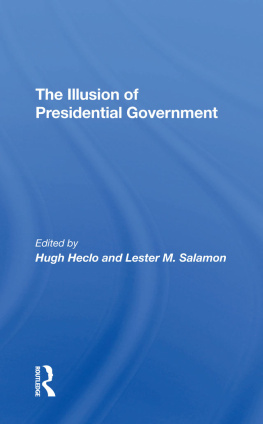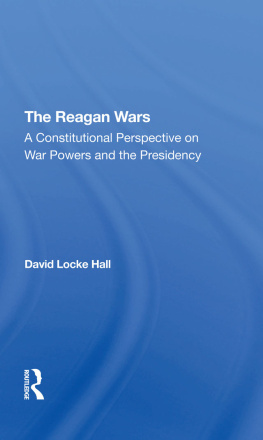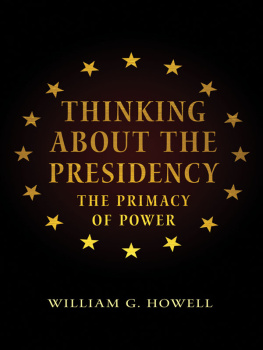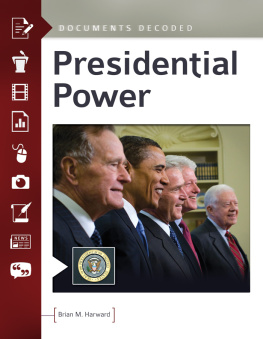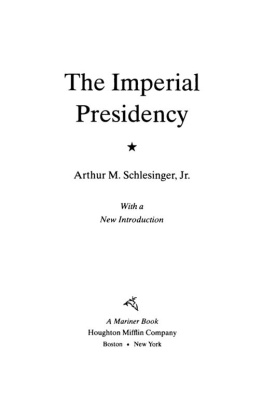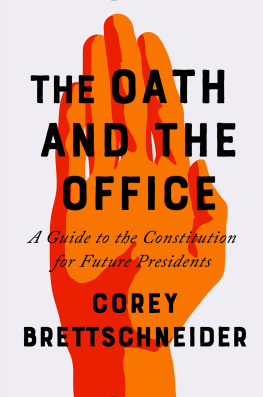THE
PRESIDENCY
AND POLITICAL
SCIENCE
THE
PRESIDENCY
AND POLITICAL
SCIENCE
PARADIGMS OF PRESIDENTIAL POWER
FROM THE FOUNDING TO THE PRESENT
SECOND EDITION
RAYMOND TATALOVICH
LOYOLA UNIVERSITY CHICAGO
AND
STEVEN E. SCHIER
CARLETON COLLEGE
WITH THOMAS S. ENGEMAN
FORMERLY OF LOYOLA UNIVERSITY CHICAGO
FOREWORD BY THEODORE J. LOWI
CORNELL UNIVERSITY
First published 2014 by M.E. Sharpe
Published 2015 by Routledge
2 Park Square, Milton Park, Abingdon, Oxon OX14 4RN
711 Third Avenue, New York, NY 10017, USA
Routledge is an imprint of the Taylor & Francis Group, an informa business
Copyright 2014 Taylor & Francis. All rights reserved.
No part of this book may be reprinted or reproduced or utilised in any form or by any electronic, mechanical, or other means, now known or hereafter invented, including photocopying and recording, or in any information storage or retrieval system, without permission in writing from the publishers.
Notices
No responsibility is assumed by the publisher for any injury and/or damage to persons or property as a matter of products liability, negligence or otherwise, or from any use of operation of any methods, products, instructions or ideas contained in the material herein.
Practitioners and researchers must always rely on their own experience and knowledge in evaluating and using any information, methods, compounds,or experiments described herein. In using such information or methods they should be mindful of their own safety and the safety of others, including parties for whom they have a professional responsibility.
Product or corporate names may be trademarks or registered trademarks, and
are used only for identification and explanation without intent to infringe.
Library of Congress Cataloging-in-Publication Data
Tatalovich, Raymond.
The presidency and political science : paradigms of presidential power from the founding
to the present / by Raymond Tatalovich, Loyola University Chicago and Steven E. Schier,
Carleton College; with Thomas S. Engeman Formerly of Loyola University Chicago;
foreword by Theodore J. Lowi, Cornell University. Second edition.
pages cm
Includes index.
ISBN 978-0-7656-4227-1 (hardcover: alk. paper)ISBN 978-0-7656-4228-8 (pbk.: alk. paper)
1. PresidentsUnited StatesHistory. 2. Political scienceUnited StatesHistory.
I. Schier, Steven E. II. Engeman, Thomas S. III. Title.
JK511.T375 2014
320.973dc23
2013028070
ISBN 13: 9780765642288 (pbk)
ISBN 13: 9780765642271 (hbk)
Dedicated to four thinkers who guided our way
Alexander Hamilton, for his precepts
Edward S. Corwin, for his scholarship
Richard E. Neustadt, for his legacy
Theodore J. Lowi, for his insights
and
To Anne, my reason for being
R.T.
To Mary, Teresa, and Anna Schier
S.E.S.
To Susan and Morgan, with love
T.S.E.
Contents
By Theodore J. Lowi
By Raymond Tatalovich and Steven E. Schier
By Raymond Tatalovich
By Thomas S. Engeman
By Thomas S. Engeman
By Raymond Tatalovich and Thomas S. Engeman
By Raymond Tatalovich
By Raymond Tatalovich
By Raymond Tatalovich
By Raymond Tatalovich
By Raymond Tatalovich
By Raymond Tatalovich and Steven E. Schier
By Raymond Tatalovich and Steven E. Schier
By Raymond Tatalovich and Steven E. Schier
By Raymond Tatalovich and Steven E. Schier
After chronicling over 200 years of presidential scholarship, the compelling lesson from The Presidency and Political Science is obvious: all modern presidents are greats compared to the vast majority who presided over our government during the previous eighteen decades or so. The task of building the presidency is now complete.
For over 200 years of American government, the presidency has been a work in progress, the unfinished business of the Constitution. But the end is here, and the future is now, because all the powers of the presidency have been revealed over the course of American history. All the gaps, all the ambiguities, all the silences in the Constitution have been overlaid with meaning. From the very beginning presidents dominated foreign affairs; but now presidents also make war with abandon. They always made recommendations to Congress, used vetoes and veto threats, and since Monroe added signing statements to legislation; now the administrative presidency is here to stay, accompanied by the use of executive orders, reorganization plans, and the deployment of czars.
Congress has played the role of co-conspirator by abdicating to the executive its constitutional role. After many years of scanning statutes, I came up with the term legiscide to characterize this abdication. Legiscide freed President Franklin D. Roosevelt almost entirely from Congress and, in particular, from the infringements of the standing committees, whose statutesaccording to Woodrow Wilsonregulate the executive departments. In Wilsons 1885 Congressional Government he proclaimed that [t]he most striking contrast in modern politics is not between presidential and monarchical governments, but between Congressional and Parliamentary governments by which he really meant government by the Standing Committees of Congress. This is a formulation that must be admirednot lost in an old, dusty reference. It should be vastly important to understand the dominance of Congress throughout the nineteenth century. Wilsons learning in constitutional law added more value, since it was the internal organization of Congress which determines its methods of legislation, which shapes its means of governing the executive departments, and the key factor in controlling the executive departments was a vast constitutional system, a system branching and expanding in statutes and judicial decisions (emphases added). These extracts from Wilson reveal the true workings of a legislative system of government. The statute was the rule that bound the president, and it worked, because at that time the national government did not have a lot to do: internal improvements, subsidies, tariffs, disposal of public lands, patents, and coinage.
The end of congressional superiority came with the Roosevelt Revolution. It was not exactly a collapse, because the national government had only so little to take over. So the executive had to invent and lengthen its list of national policies, longer even than the list of state government duties, and the national government grew that list in 100 days and another second-hundred days when Congress yielded power over what determines its methods of legislation governing the executive departments (emphasis added). And with all that, statutes from Congress virtually disappeared. The economic collapse meant that Congress did not have enough time and research to write a good statute. The legislators had to send generalities to the president, as if in a modern version of the monarchy that virtually all the original elite had feared and loathed. All of the leaders of the standing committees declined to send messages that were anything other than loose authorization: Do something. The learned constitutional lawyers tried to soften their losses with doctrines of delegation of power and filling in the details, to make it look like legislation and statutes, and by yielding: there wasnt time to get to research. Yes truly, there was not enough time, because the national government leaders had not built what Wilson had praised as methods of legislation to direct the Executive.

